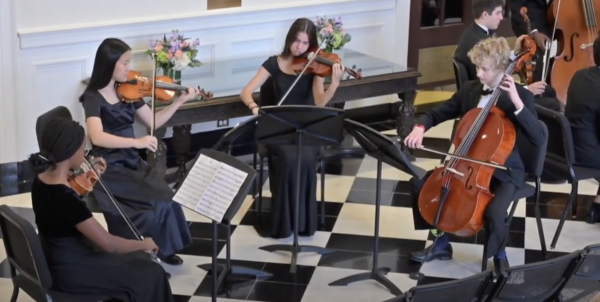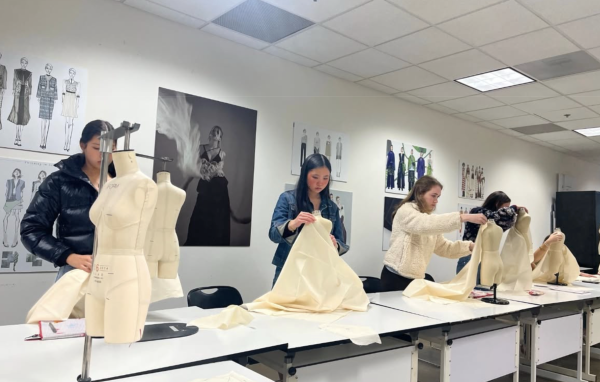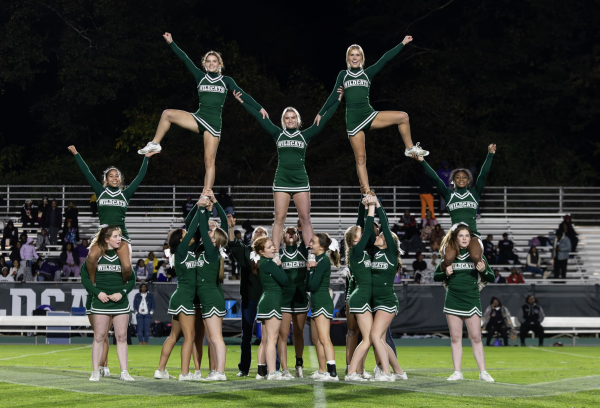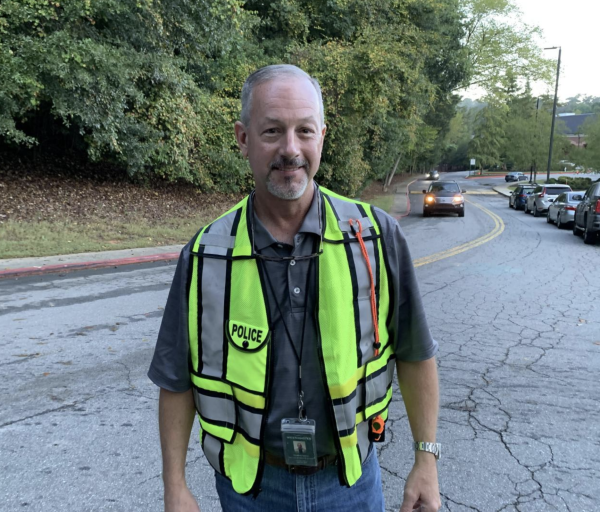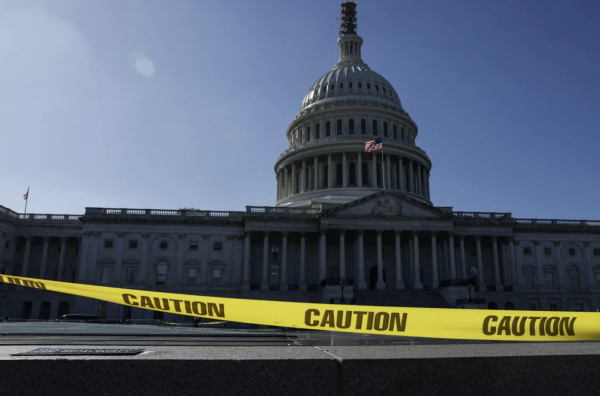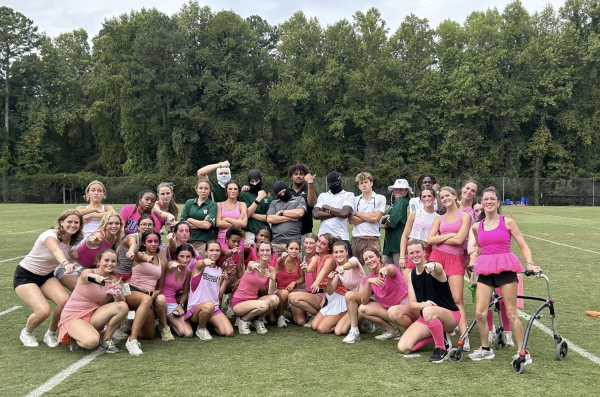Orchestra lockout endangers local music scene
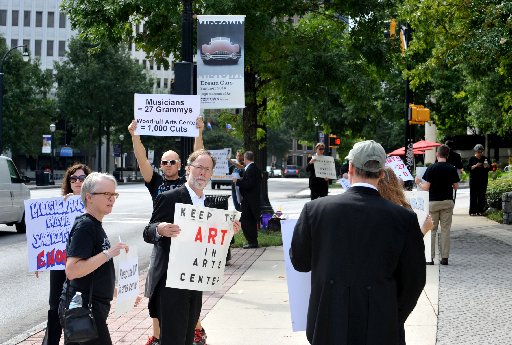
Photo courtesy artsculture.blog.ajc.com
Midnight of Sept. 6, 2014 marks the second time in two years that the musicians of the Atlanta Symphony Orchestra (ASO) have been locked out by their management, the Woodruff Arts Center.
“Our paychecks were stopped, our key cards were deactivated immediately,” said Jessica Oudin, violist in the ASO and one of the eight members of the Atlanta Symphony Orchestra Players’ Association (ASOPA), which represents the musicians, “and our health insurance was terminated on Oct. 1.”
The lockout comes immediately after talks to renegotiate a contract failed and the expiration of the previous contract, with the management and musicians of the orchestra unable to agree on new terms. This season also happens to be the 70th Anniversary of the ASO.
“…This is the second lockout in a 2-year period in which the symphony management and the symphony musicians cannot agree on the terms of their employment contract,” said Upper School band conductor Scott Stewart. “The terms which are in dispute involve salary, benefits, size of the orchestra being under control of management rather than the players, and performance opportunities.”
In years past, the ASO has traditionally had a 52-week season, as well as 95 full-time players. However, in another lockout two years ago, negotiations forced the musicians to decrease their playing time and members. The situation in 2012 lasted just three weeks before the compromises were made.
“We gave up 15% of our annual salary, we lost 10 weeks of work, and we saw a reduction in the size of our orchestra from 95 to 88 full-time musicians,” said Oudin. “We made these concessions because we were told that these steps were a necessary ‘one-time course correction’ to help balance the institution’s finances.”
After the management’s promise that the musicians would not have to face any more pay cuts, further downsizing this year has become a point of debate. In this year’s negotiations, the players would have had a 4.5% increase in pay over four years; however, the gains would have been offset by the extra money asked to cover health benefits.
“[Two years ago], the musicians were asked to take a $14,000 cut in pay and promised that this would be a one time only,” said Linda Cherniavsky, director of performing arts and conductor of the Chamber Orchestra. “And they signed a two-year agreement and now they find themselves in the same place. And they don’t make a lot of money – $14,000 was really challenging for them to lose, but to lose $28,000 is not really workable.”
As of now, the ASO players are not receiving any paychecks other than those for unemployment – $112 a week, which they have been on for the entire summer. In addition to pay cuts, another point of debate in the negotiations has been the size of the symphony. In the new negotiations, the management pushed to shrink the orchestra, as well as take away the musicians’ right to determine the minimum number of players – a privilege traditionally reserved for an orchestra’s own players.
“The most insidious part of management’s proposal is that they wish to completely do away with a ‘fixed complement’ – or minimum number of players necessary to make up the Atlanta Symphony Orchestra,” said Oudin. “This is unprecedented in our industry…The musicians cannot allow the sole power in determining if/when/how positions within the orchestra are filled to rest with management, as this is an artistic matter.”
On Sept. 5, prior to the date for the previous contract’s expiration, the Woodruff Arts Center (WAC) presented an electronic proposal to the musicians entitled the “Last, Best, and Final Offer”, enclosing the overall pay cuts, as well as downsizing. When the musicians appealed with a new proposal before the midnight deadline, the WAC refused to negotiate further and instead locked out the players. Furthermore, the management refused the musicians’ offer to “play and talk”, or to continue working while negotiating.
“The orchestra was prepared to continue to work while negotiating. It’s not that unusual in a labor dispute to work while you don’t have a contract – you just extend the existing contract and continue to negotiate,” said Cherniavsky. “But that wasn’t the situation here because this is not a strike – this is a lockout where the management said, ‘We’ve given you our last offer and you refuse to accept it, and so therefore we’re not obligated to hire you any more.’”
The ASO has been operating under a deficit since 2001, a reason heavily cited by the management for its inability to renegotiate a contract and its decision to lock out the musicians. Causes for the deficit may reach back to 1962, when a plane crash killed 100 of Atlanta’s most prominent arts patrons. Whether the money gap has been filled still remains to be seen; however, the way Atlanta’s professional orchestra operates may have fundamental problems.
“There is a flawed business model by most American orchestras. From the very beginning when the Boston Symphony started, [they began their first season] in 1881 in major deficit,” said Stewart. “But most businesspeople would say [that] to base your business model primarily on philanthropy, by depending on donations from patrons, is probably very risky.”
The lockout in Atlanta also points to a larger predicament with the symphony orchestra model in general.
“Every arts organization can float a deficit for a long time because of the way they account for it and because of their endowment,” said Cherniavsky. “But there comes a time when it’s not sustainable.”
Some may argue that the arts have been underappreciated in Atlanta as well as in other states, and the current lockout is simply a manifestation of the problem. Ticket sales have decreased in the past few years, and the performing arts perhaps just don’t have the popular appeal that other pastimes – like football – do.
“This is…a national discussion about the relevance of orchestral music and about the arts in general, and what the arts need to do to position themselves into a place of relevance and meaning the way that football has, for example,” said Stewart. “Nobody questions the fact that they’re putting up a Braves stadium up the road here…It’s a multimillion-dollar contract for 25 years to name it the Suntrust Stadium. Shouldn’t that be easy to do with an orchestra?”
Apparently not- as the Atlanta Symphony Orchestra is inextricably linked to other orchestras across the United States, its counterparts have encountered this problem as well: the Minnesota Orchestra endured a 16-month lockout, and the Detroit Symphony Orchestra and the New York Metropolitan Opera have had similar labor issues.
“The Atlanta Symphony is part of a system of professional orchestras all across the United States – the League of American Orchestras. So the fact that Atlanta took this cut in pay, which is something that you never want to do if you’re subject to collective bargaining agreement – it kind of was unsettling in the orchestra community nationally,” said Cherniavsky. “But it also pointed to the risk of the business model of a symphony orchestra. It is unstable – it depends on philanthropy, it depends on endowment income, which has dropped since the economy tanked.”
The current lockout has also stirred conversation about the customary undervaluing of the arts.
“Mainly I’d just say that there’s not enough support for the arts in the city as a whole,” said violinist and junior Eliza Namnoum. “Georgia [is] 50th in the US for money towards the arts. So I feel like the people of Atlanta aren’t supporting it enough.”
Overall, the city of Atlanta’s attitude towards classical music cannot be described as too enthusiastic – an opinion agreed upon by many of the musicians in Westminster’s own chamber orchestra.
“Everyone doesn’t go to the ASO and see them every weekend, it’s not a huge thing – it’s usually athletics, like football games and stuff, that get all the money,” said violist and freshman Ashley Ahn. “So I can see how the community hasn’t really supported them a whole lot.”
However, despite an apparent lack of support from the Atlanta community, poor management still seems to be a major cause for the lockout. After failing to secure a new contract, Dr. Stanley Romanstein, the CEO of the ASO since 2010, resigned on Sept. 29.
“He [signed] off on the collective bargaining agreement, and he, two years ago, said ‘I will not ask this again’. He lost credibility,” said Cherniavsky. “When you lose credibility, you can’t negotiate a contract.”
The promise made two years ago – that the musicians accuse has been broken – plays a large role in the players’ indignation over the new contract.
“I think it is fair to say that, because of what we went through only two years ago, the musicians are firmly united in their resolve to fight for a better future for themselves and for the ASO,” said Oudin. “We made the sacrifices that were asked of us – and yet we are still being told that further cuts are necessary to balance our budget.”
A former executive of the Coca-Cola Company and current ASO board member, Terry Neal, will serve as the interim president and manage the day-to-day affairs of the ASO. However, bad feelings may still remain between the management and its players.
“We can demonstrate that the musicians’ compensation has come in under the amount that was budgeted,” said Oudin. “The musicians have not been the cause of the deficits, and we will not allow ourselves to be blamed for them.”
Most of the blame, therefore, has fallen to the WAC – for asking for pay cuts again, and for not being able to eradicate the deficit.
“I think the musicians feel a sense of betrayal of management, not to honor the agreement that they would not ask for an additional cut in pay,” said Cherniavsky. “I am surprised that the musicians signed a two-year agreement; they should have gone for a longer agreement, thus giving management more time to raise more funds and to try and come up with a more creative solution of capitalizing their salaries over time.”
Other than an inability to balance the symphony’s budget, there are signs of poor management in general by the WAC, such as salary distribution and number of employees.
“There are other questions that I have – why there are more people that work for the Atlanta Symphony than play in the Atlanta Symphony?” said Stewart. “Why did the president of the Atlanta Symphony get a 45,000 dollar bonus the last time they were locked out? Why did he have such a massive salary that was much bigger than most of the players in the orchestra?”
However, it appears that the blame may not fall solely on Romanstein.
“I suspect that Dr. Romanstein was charged to lead the Atlanta Symphony in this direction by the WAC,” said Cherniavsky. “It’s important to note that he does not have previous orchestral management experience.”
The clash of business and arts has long since been a point of dispute within symphony orchestras, which may contribute to the current lockout.
“We’ve been headed in this direction for a long time,” said Cherniavsky. “Even since the last major strike in ‘96, there had been problems – there have been artistic leadership problems, and there have been some administrative problems.”
Business management and the musicians they manage have not always seen eye to eye.
“I think that’s often one of the tensions in these things – that businesspeople and arts people come from very different backgrounds and don’t always speak the same vocabulary and have the same types of concerns at the core of their operation,” said Stewart. “There are very often times business people running an arts organization and that’s a fundamental headbutting thing.”
Besides the inactivity of the Atlanta Symphony Orchestra itself, the lockout has other repercussions. The ASO has previously fostered two programs for youth musicians: the Atlanta Symphony Youth Orchestra, arguably one of the best youth orchestras in the state, and the Talent Development Program, which helps musically gifted African American and Latino students develop and grow their classical skills. Both of these programs have been unable to proceed this year as well.
“It also affects ASYO, the Atlanta Symphony Youth Orchestra, which I was going to audition for – they weren’t able to judge the auditions for the ASYO so that’s not happening,” said Ahn. “The email said it was postponed, but my teacher said she’s pretty sure it’s canceled.”
The indefinite postponing of the ASYO season is a great loss to the music community as well.
“I think it’s very sad that canceling the youth symphony auditions means that this generation of string players will not have the same opportunity to perform as others have,” said Cherniavsky. “I really believe that the ASYO is very important to have that orchestra for people to come together and play on a very high level with good coaching from members of the symphony.”
The ASO lockout also leads to a disappointing loss of opportunity for this year’s prospective youth musicians.
“I’ve been practicing the audition music for such a long time – like several months – and they canceled,” said Ahn. “It’s pretty saddening because I wanted to see if I would get in, so that affected me a lot.”
With the lockout, some may wonder what will happen to the JanTerm class “The Symphony Orchestra: A Party from the Past Reimagined for the Future,” to be taught by Cherniavsky and band conductor Freddy Martin.
“I think it’s too early for Mr. Martin and I to say that we’re going to change the design of the course. But now, with Mr. Romanstein’s departure, we’re going to have to re-establish our relationship to the symphony,” said Cherniavsky. “So we’re going to be re-tooling it a little bit and I’m optimistic that this will be resolved before January – and if it isn’t resolved before January, then we’ll have to completely re-design it in a different way. But we’ll still be able to fulfill our objectives in terms of teaching our students how a symphony orchestra works.”
Adding another unique side to the lockout’s story, the orchestra’s conductor, Robert Spano, along with principal guest conductor Donald Runnicles, have released a statement regarding the situation. Traditionally, however, conductors have stayed out of labor disputes.
“I believe that it was out of personal respect and friendship with members of the orchestra,” said Cherniavsky. “I think it’s really important that they are trying to speak to the value of the arts in the Atlanta community and I think that Atlanta is looking for that kind of leadership from the Atlanta Symphony.”
In an open email to the ASO board, the conductors rather diplomatically urged the management to support the musicians and acknowledge their sacrifices.
“I think that the actions of both Robert Spano and Donald Runnicles have been nothing short of courageous and awe-inspiring. Together they have stood up for our art – for our music – which is what brings us all together in the first place,” said Oudin. “We are all but stewards of something so much greater than ourselves; we are but servants of the music, and the musical legacy of the ASO. Everyone entrusted with this legacy has a duty to protect and uphold it – and that is exactly what Robert and Donald have done.”
The “legacy” of the ASO includes an impressive collection of 27 Grammy Awards, the latest being from 2009, elevating it to be counted among the world’s greatest orchestras.
“It’s the pinnacle arts organization of our city. It’s recognized internationally as being a very fine orchestra. It’s the only orchestra within a thousand mile radius,” said Cherniavsky. “You have to go to Washington, D.C. or Dallas or Miami to get anything that’s even close.”
By removing an orchestra as renowned and celebrated as the ASO from the scene, the lockout has crippled the city’s arts community.
“All of us look to the Atlanta Symphony as the flagship musical organization of Atlanta,” said Stewart. “It is the standard-bearer of music making, which flows down to all of the rest of us that are teaching, playing in community orchestras and bands, and so it’s very disheartening to see our colleagues and friends out of work but also to see what we see as a leading organization in the arts struggling like this.”
The ASO has been an organization to look up to for students as well.
“I think it’s incredibly valuable; it’s like a huge part of the artistic culture of the state and of the south, and the symphony orchestra has won a number of Grammys and made some great contributions to the music world,” said Namnoum. “It’s something that’s incredibly valuable to Westminster orchestra, too, because we have the option to go and to listen and to listen and to learn and to observe some of the country and the world’s best musicians right here in Midtown.”
The players of the Atlanta Symphony have had a large influence on youth musicians, especially through their concerts.
“Since I was really young, I went to their performances and concerts and I watched them play and always dreamed of playing on a big stage – so they’ve been a big role model to me,” said Ahn. “It’s a dream to be at that high level…They are the only symphony orchestra here in the professional level in Atlanta and…they are big role models for people like us who play instruments.”
Public concern for the ASO has been made known widely through social media, namely sites like Twitter and Facebook.
“I saw that a lot of people were commenting on the posts and saying what they thought, and I thought that was really good because that could really help them get back where they used to be – you know, just spread awareness,” said Ahn. “That’s what social media is – it’s like spreading communication.”
Much of the awareness about the lockout has extended through Facebook, as the musicians’ supporters share links and messages with others.
“It first came to my attention when Timothy [Shu, Westminster Class of 2013] was posting about it, and he changed his icon and posted a link to an article about it,” said Namnoum. “I’ve seen it…from other people too – there are people commenting on the post. I’ve definitely seen the presence of awareness on Facebook.”
Additionally, others have been active on social media – Richard Prior, the director of Orchestral Studies at Emory University as well as the conductor of the Emory University Symphony Orchestra and the Emory Youth Symphony Orchestra, has been consistently taking to Facebook to post messages of support for the symphony players.
“The philosophical, humanistic, socioeconomic and artistic arguments are deeply complex,” said Prior, “but the only morally acceptable outcome is a restoration of the music by the return of a fully-complemented, transparently managed and nurtured orchestra.”
The players themselves are also grateful for a medium in which they can connect with the public.
“The ability to communicate with our community, our supporters, and our musical colleagues all over the world through the explosion of social media has been incredible,” said Oudin. “It is so much easier to engender grassroots support through the use of social media than it ever has been in the past.”
As of Oct. 6, both sides had contacted a federal mediator, Allison Beck. As the acting director of the US Federal Mediation and Conciliation Service, Beck has also had previous experience with orchestra labor disputes – she helped the Metropolitan Opera work out its own issues.
Hopefully, with the new input of a federal mediator, the ASO lockout will be resolved as quickly as possible.
“A city as vibrant as Atlanta deserves a world-class orchestra,” said Oudin. “We are committed to preserving the artistic integrity, quality, and traditions that have made us the esteemed ensemble that we are today. We are committed to being a permanent part of Atlanta’s cultural scene, and a positive force within our community.”
The resolution of the lockout and the resumption of the Atlanta Symphony Orchestra, especially on its 70th anniversary season, is critical to Atlanta as a whole.
“I think it’s just so important that every major city in the world has a professional symphony orchestra,” said Cherniavsky. “If Atlanta is going to continue to be that community, we need this.”
